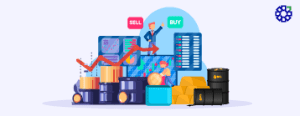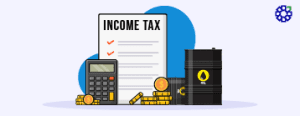Commodity Futures
- 14th August 2025
- 12:00 AM
- 7 min read
Commodity futures might sound complex to new investors. However, both commodities and futures are powerful trading tools that can generate substantial returns.
A robust first-quarter performance for FY26 was reported by the Multi-Commodity Exchange of India Ltd (MCX). The net profit increased 49.9% sequentially to INR 203 crore from INR 135.4 crore in the prior quarter. This surge shows that commodity trading has become very profitable for Indian investors.
This blog breaks down what is commodity futures, how they function, and how you can trade them.
What Does Commodity Futures Mean?
Commodity futures are standardised contracts which you can use to buy and sell a certain quantity of a commodity at a fixed rate on a future date. Two parties use these contracts to conduct business at a given price.
These contracts are exchanged on exchanges and cover a wide range of commodities. These include metals like gold and silver, energy items like oil and natural gas, and agricultural products like wheat and corn. The primary goal of trading commodity futures is to hedge against price volatility.
How Does Commodity Futures Trading Function?
Investors trade commodity futures with an expectation of making a profit from the price movements. Hedgers also use this type of derivative contract to safeguard themselves from price movements. The pointers below explain how a commodity futures trading function:
- A commodity exchange creates a futures contract.
- Both buyer and seller must deposit a portion of the contract’s value as an initial margin to guarantee commitment.
- Since the contract is marked to market every day, profits and losses are determined by taking into account the price movements of that day.
- Either a cash settlement or the actual delivery of the commodity is used to complete the contract on its expiration date.
Objectives of Commodity Futures Trading
Protecting the unfavourable price movements of a commodity is a top reason to invest in the futures market. Here are some other objectives to trade in commodity futures:
-
Price Discovery
You can easily identify commodity prices based on supply and demand dynamics using futures markets. Futures contract prices give producers, consumers, and policymakers important information by reflecting the expectations of all market players.
-
Speculation
Traders and investors use futures contracts to predict the movements in commodity prices. Speculators can earn from buying low and selling high, or vice versa, by forecasting price movements.
-
Liquidity Provision
Since there are a huge number of traders in the futures market, there is increased liquidity in the commodity market. High liquidity ensures consistent market functioning and helps investors open and close positions without worrying about price volatility.
-
Effective Budgeting
Businesses can budget and plan their finances more effectively, since it reduces the uncertainty of the volatile commodity prices.
How to Trade Commodity Futures – Step-by-Step Guide
Now that you know commodity futures meaning and their objectives, let us understand how to trade commodity futures with the steps below:
-
Opening a Trading Account
Open a commodity trading account with PL Capital Group – Prabhudas Lilladher, since it offers commodity futures trading services with numerous features. When you open a trading account with PL, you do not have to pay any annual maintenance fees.
-
Research and Analysis
Learn everything you can about the commodities you want to trade. This entails examining past pricing patterns, supply and demand factors, and market circumstances that may affect prices. PL also offers numerous features like market screeners and investment strategies that help grow.
-
Understanding the Terms and Conditions
Understand the terms and conditions of the futures contracts you want to trade. This entails being aware of the expiration dates, margin requirements, contract size, and tick size.
-
Trading Plan:
Create a trading plan based on your research that includes position sizing, risk management guidelines, and entry and exit points.
-
Place Orders
To place buy or sell orders for futures contracts, use PL DigiTrade, the trading platform of PL Capital. You can put a market, limit, or stop order based on your plan.
-
Tracking
Keep an eye on the market and your positions at all times. Be ready to change your plan in response to changes in the market and your desired profit and loss.
-
Closed Positions
If you do not plan to accept or deliver the commodity, close your holdings before the contract expires. By adopting an offsetting stance, this can be accomplished.
Benefits of Commodity Futures
-
Leverage
Commodity futures trading enables traders to manage huge positions with small capital. Due to this significant leverage, a small initial investment might expose a huge portion of the commodity.
-
Liquidity
Due to its liquidity, there is a high volume of trading activity. As a result, traders can easily buy and sell futures contracts without impacting prices.
-
Hedging
By hedging against price fluctuations, these futures eliminate uncertainty for producers and end users.
-
Transparency
Commodity futures trading ensures transparency by providing real-time pricing details to you. This also fosters fair competition and the discovery of prices.
Limitations of Commodity Futures
-
High Risk
Due to the high level of leverage, you may incur substantial losses. Leverage can increase profit, but it can also incur losses if the market moves against the trader’s position.
-
Complex
The commodity futures market is complex. It can be difficult for beginners to handle this complexity. They may suffer losses as a result of their inexperience.
-
Volatility
Unpredictable results might arise from the excessive volatility of commodity prices. Natural disasters, supply chain interruptions, and geopolitical complexities can all result in price fluctuations.
Final Thought
Commodities play a crucial role in the Indian financial landscape as they provide mechanisms for profit-making and risk management. While there are numerous benefits, you should also consider the potential drawbacks of commodities futures trading.
You can also trade in commodity futures using the PL DigiTrade application. With this, you can learn about the put-call ratio and establish precise stop-loss orders using different tools.
Frequently Asked Questions
1. Which commodities futures are the most often traded in India?
Commodities like gold, silver, crude oil, and copper are often traded in India.
2. Is trading in commodities futures regulated in India?
Commodity exchanges allow you to trade commodity futures contracts. The SEBI oversees the management and regulation of commodity trading in India.
3. Who is eligible to trade commodities futures?
Anyone with a trading account can trade in commodity futures. You must ensure that the broker is registered with SEBI.
4. Do commodities futures earnings have any tax implications?
You must pay taxes on your net result based on the appropriate tax rate if it is a profit. However, if your net result is a loss, you can deduct it from any future earnings and carry it over to the next year.





